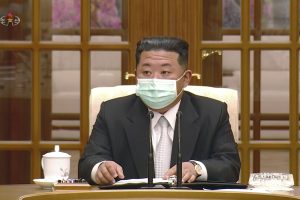North Korea launched three short-range ballistic missiles (SRBMs) from the Sunan area, near Pyongyang, toward its east coast at 6:29 p.m. KST on Thursday, Seoul’s Joint Chiefs of Staff (JCS) said. South Korean and U.S. intelligence officials are analyzing the performance of the tested missiles but said the North seems to have fired a multiple rocket launcher.
This missile test came five days after North Korea launched a submarine-launched ballistic missile (SLBM) on May 7. The JCS said the SLBM flew about 600 km with an altitude of 60 km. Oddly, the North has not publicly reported on any of its missile tests since North Korean leader Kim Jong Un ordered his military to strengthen the country’s nuclear capabilities during his speech at the military parade on April 25.
Hours after the JCS detected North Korea’s missile test, the Office of National Security for new South Korean President Yoon Suk-yeol called the North’s missiles “grave provocations” and said it “strongly condemned” the missile test. After Yoon took office on May 9, the JCS and the National Security Council have started using direct language to denounce the North’s missile tests, demonstrating its different approach to North Korea. The previous Moon Jae-in administration had taken a more oblique approach, calling the devices “projectiles” and speaking of its “regrets” after North Korean missile tests.
It is typical for North Korea to conduct missile tests soon after a new government takes office in South Korea. However, today’s missile test seems to have been conducted spontaneously.
North Korea usually tests its missiles in the early morning KST. However, the three SRBMs were launched in the evening, a possible indication that the missile test was a last-minute decision.
Meanwhile, Korean Central News Agency, the North Korean state media outlet, reported that a confirmed case of the Omicron variant, a particularly contagious subvariant of COVID-19, had been discovered in North Korea. KCNA said that Kim ordered a complete lockdown of cities and counties in the country.
Since the COVID-19 pandemic began in late 2019 in China, North Korea has been accused of hiding the actual counts of confirmed cases. Kim has taken drastic anti-pandemic measures, including closing the border with China, North Korea’s top trading partner, to prevent COVID-19 from spreading into the country. Until Wednesday, North Korea had consistently claimed that the country had not seen any confirmed case of the coronavirus. However, the North’s state media unexpectedly reported the failure of Kim’s anti-pandemic measures on Thursday while showing Kim presiding over the Politburo of the ruling Workers’ Party to discuss the issue.
In this context, Kim might fear his regime and power are jeopardized by a surge of COVID-19 cases within his country. The failure of the anti-pandemic measures is unacceptable, as Kim’s aggressive attempts to block the virus have shattered the country’s economy, already in dire straits from U.N. sanctions.
As the United Nations Security Council (UNSC) held an emergency meeting on Wednesday in the wake of the North’s ballistic missile tests, today’s missile test could also be interpreted as a response to it. However, China and Russia have opposed any new sanctions against the North and they both have veto power as permanent members of the UNSC. Under those circumstances, UNSC meetings after North Korean missile tests would have no power to affect Pyongyang’s plan for its missile developments.
































